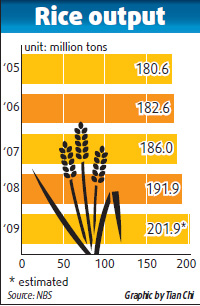China turns to GM rice for food supply
The government is expected to approve commercial planting of genetically modified (GM) rice in three to five years as a major effort to raise food supply.
![A farmer smiles after a good harvest of the high-yielding “super rice” in Tiantai, Zhejiang province.[China Daily] A farmer smiles after a good harvest of the high-yielding “super rice” in Tiantai, Zhejiang province.[China Daily]](http://images.china.cn/attachement/jpg/site1007/20100204/00114320f5750cd45d3301.jpg) |
|
A farmer smiles after a good harvest of the high-yielding “super rice” in Tiantai, Zhejiang province. [China Daily] |
Huang Dafang, a member of the Biosafety Committee at the Ministry of Agriculture, said the nation - which faces shrinking farmland and an increasing population - will turn to genetically modified organism technology to ensure grain security.
The revelation comes amid government calls for stepped-up efforts to mass-produce and commercialize GM crops based on scientific assessment and strict regulation.
In November, the ministry issued bio-safety certificates to strains of pest-resistant GM rice and corn.
But the strains need registration and production trials before commercial output can begin, which may take three to five years, Huang told China Daily.
"The issuing of bio-safety certificates has great implications as it is the first time a major grain producer is endorsing the use of GM technology in a food staple," said Xue Dayuan, professor of biotechnology at Minzu University of China.
The government has set a target of increasing grain output by 50 million tons between 2009 and 2020.
"Once GM technology is used for mass production, it would definitely help China achieve that target and feed its 1.3 billion people," said Huang, also a researcher with the Biotechnology Research Institute of the Chinese Academy of Agricultural Sciences.
Thereafter, "it will be of great political and economic significance," he said.
"The use of GM technology is an inevitable trend for the global agriculture industry, including China," he stressed, adding that it has been scientifically proven that the approved GM strains are as safe as non-genetically modified varieties.
Currently, 10 percent of the non-genetically modified rice output is lost annually due to pests, and "that means the loss can be avoided with wide use of the technology," he noted.
The two GM rice strains, developed by Huazhong Agricultural University, would help reduce the use of pesticide by 80 percent while raising yields by as much as 8 percent, said Huang Jikun, a scientist at the Chinese Academy of Sciences.
The ministry granted safety certificates to other GM crops like cotton in 1998 and tomato and pepper in 1999.
The United States is also a major developer of GM crops and most of the country's soybean and cotton are from GM strains. However, a rice strain which has been given approval for cultivation has not yet seen widespread use.
 |
|
[China Daily] |
But given the controversy over the safety of GM food for a long time, such crops are not accepted in most countries, said Fang Lifeng, spokesman for Greenpeace China's GM program.
A 2007 survey by the organization found that 65 percent of the 2,000 polled in the country said they would not choose GM food for safety reasons.
We firmly oppose the technology being put into mass production and commercialization in a rush," Fang said.
"To ensure food supply, we have other options with no potential health risks like biological agriculture," he noted.
GM corn sold by Monsanto, the US-based agriculture company, causes organ damage in rats, mostly in the liver and kidney, according to a paper by three French scientists published in the International Journal of Biological Sciences.
These substances have never before been an integral part of human or animal diet and therefore their health consequences for consumers, especially over the long term, are currently unknown, the paper said.
Monsanto, in response, denounced the study on its website, asserting that "these claims are based on faulty analytical methods and reasoning and do not call into question the safety findings for GM products."
 0
0 






